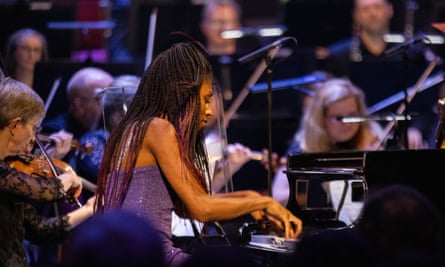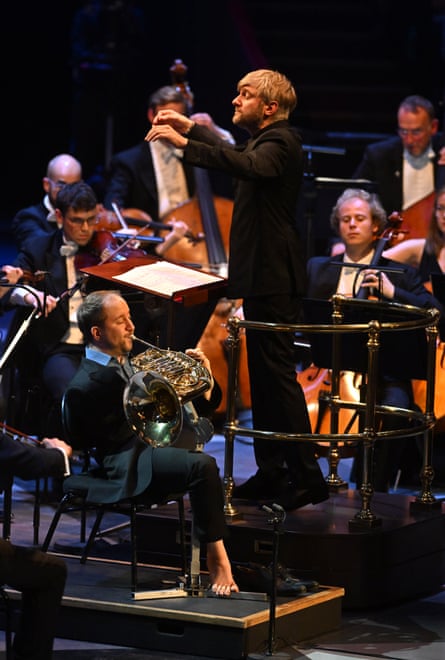You might expect the composer of a major work that had just received wild acclaim at its first performance to relax a little and bask in his success. Not Felix Mendelssohn. Immediately after the 1846 Birmingham world premiere of his oratorio Elijah, he led critics and friends down to the banks of the nearby grimy canal and sat them among the coal and cinder heaps to discuss the revisions that he realised – even while conducting it – were needed. Those changes produced a performing edition that became a much-loved pillar in the British choral repertory for decades, but its sometimes complacent sentimentality – what George Bernard Shaw dismissed as “exquisite prettiness” – saw it fade in popularity. No doubt some ponderous performances from unwieldy choral societies also contributed to its eclipse.
Paul McCreesh, with the Gabrieli Consort, did much to rehabilitate Elijah at its last Proms outing in 2011, when he recreated that first Birmingham performance with 300 singers and an orchestra of more than 120. But its return to the Albert Hall last week, under the exciting direction of Maxim Emelyanychev (Prom 19), showed that it can be even more effective with smaller forces.
Emelyanychev, famed for his quicksilver interpretations of Mozart and Handel with the period ensemble Il Pomo d’Oro, brought an entirely classical sensibility to this Victorian warhorse, the Scottish Chamber Orchestra, using natural horns and trumpets, responding to his brisk, springy tempi with tremendous verve. Mendelssohn’s response to the drama in the prophet Elijah’s life – his challenge to the pagans, his exile and his ascent into heaven in a fiery chariot – could not have been more vividly portrayed.
The SCO Chorus, tightly rehearsed by chorus master Gregory Batsleer, brought the whole piece to life, alert to every nuance in their beautifully enunciated text, their sound perfectly balanced and topped with a golden soprano line. Baritone Roderick Williams shone as Elijah, leading a starry lineup of major soloists – tenor Andrew Staples, mezzo Helen Charlston and sopranos Carolyn Sampson and Rowan Pierce. Together, all these sophisticated performers made us re-evaluate Elijah and appreciate its abundant musical generosity. A revelatory evening.
The career of pianist Isata Kanneh-Mason is soaring, as she makes appearances with top orchestras all over the world while also giving recital tours in Europe and the far east with her cellist brother, Sheku. Last week saw her solo debut at the Proms, playing Prokofiev’s extrovert piano concerto No 3, with the BBC National Orchestra of Wales, conducted by Ryan Bancroft (Prom 22). There was so much to enjoy in her liquid pianism: her breathtaking handling of the unison run up the keyboard that closes the first movement; her authoritative dismissal of the second movement’s fiendish variations; and the joyful swing she brought to the closing pages of the finale. Some heft might have been lacking in a few of the beefier passages, but this was an assured, exhilarating performance.

It was also a great night for clarinettist Peter Sparks. Both the Prokofiev concerto and Tchaikovsky’s fifth symphony that followed open with clarinet solos, beautifully realised by Sparks. His handling of the Fate theme in the Tchaikovsky set the tone for the rest of the symphony, which caught fire under Bancroft’s clear direction, the emotional climaxes particularly well engineered. Refreshingly, this is a conductor who is not afraid to show his pleasure at his musicians’ achievements, smiling encouragingly as horn soloist Tim Thorpe worked his way through the second movement love theme, and swooning with the strings when they took it up. The ambiguities of the last movement’s triumphant march seemed not to trouble him – or the Prommers, who roared their approval.
There was more fine clarinet playing the following evening (Prom 24) when the Bournemouth Symphony Orchestra’s Barry Deacon lovingly caressed the aching, song-like third-movement solo – that great arc of longing – in their impassioned reading of Rachmaninov’s second symphony, its interconnected, intensely romantic themes sweeping through each movement like a series of sweet regrets.

Conductor Kirill Karabits opened with a piece by his father, Ivan, a prominent Ukrainian composer who died in 2002. His Concerto for Orchestra No 1, “A Musical Gift to Kyiv” was written in 1981 to mark the city’s 1,500th anniversary. It’s a cinematic, episodic, joyous celebration of the Ukrainian capital a decade before the end of the Soviet era. Playing it today feels like an act of defiance for a place now plunged unwillingly into war with Russia. Tolling bells, heralding trumpets and chattering woodwind paint impressionistic portraits of Kyiv’s landmarks: the flowing Dnipro River, the Great Gate, St Sophia’s Cathedral and the city’s main Khreshchatyk Street among them. The BSO romped through it all with ease, even when called upon to imitate the gusli, an ancient Slavonic multi-stringed folk instrument.
Felix Klieser is an award-winning German horn player, born with no arms. He mounts his instrument on a tripod and operates the valves with the toes of his left foot. He was just five years old when he took his first horn lessons. He’s currently artist-in-residence with the BSO and made his Proms debut with Mozart’s much-loved fourth horn concerto in E flat. Klieser’s sound is big, bold and punchy – very suitable for such a bucolic piece. “If you have a problem, it doesn’t matter how big it is, you can solve it,” he says, challenging perceptions of what we all can achieve in life and setting an engaging example to aspiring young musicians everywhere.
Star ratings (out of five)
Prom 19 ★★★★★
Prom 22 ★★★★
Prom 24 ★★★★

